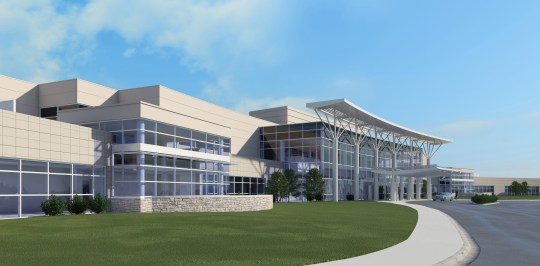Four hospitals have closed in the past two years. Many areas can’t attract doctors, or have trouble keeping the ones they have. Some counties are without a hospital or other critical health services.
Those rural health care problems in Georgia were among the issues discussed at the initial meeting Monday of the Rural Hospital Stabilization Committee, recently appointed by Gov. Nathan Deal.
The panel was created to identify the needs of rural facilities and offer potential solutions. Members include hospital leaders, physicians and state lawmakers.
“The task is not going to be an easy one,’’ said state Rep. Terry England (R-Auburn), a panel member who chairs the powerful House Appropriations Committee. “We’re open to a lot of different ideas and solutions.”
Possible remedies include a new initiative for a financially troubled hospital to downsize into a freestanding rural emergency department.
One strategy that went without much discussion was expanding the state’s Medicaid program.
Consumer advocates and industry leaders have said expansion would give coverage to hundreds of thousands of uninsured in Georgia, turning many into newly paying patients — and thus helping a hospital’s bottom line.
The Affordable Care Act offers incentives for states to expand their Medicaid programs, but the U.S. Supreme has ruled that states don’t have to do so. Georgia’s GOP-led government has rejected expansion, citing the cost.
Sen. David Lucas (D-Macon), a committee member who has sponsored rural health legislation, noted that the General Assembly earlier this year passed a bill adding a legislative hurdle to expanding Medicaid. That makes it harder for any future leadership to reverse course and approve expansion.
“The Legislature took it off the table,’’ Lucas said.
The only other mention of expansion came from Dr. Thomas Fitzgerald, a committee member who is also a Carrollton emergency medicine physician. While calling for the panel “to think outside the box” on addressing the state’s problems, Fitzgerald said expanding Medicaid “is the worst thing we can do.”
The rural hospital panel’s formation suggests the growing importance of rural health care as an issue during this election year.
Democratic gubernatorial candidate Jason Carter, visiting Montezuma’s Flint River Community Hospital, which closed its emergency room and other services last year, said Monday that Gov. Deal and other Republican political leaders “waited frankly until an election year” to confront the rural health problem.
Their actions “have been short-term Band-Aids on a very serious problem,” said Carter, who added that he supports Georgia moving forward on Medicaid expansion.
Jimmy Lewis of HomeTown Health, an organization of rural hospitals in the state, said at the committee hearing in Atlanta that about 15 rural facilities in Georgia hospitals are very fragile financially, in danger of closing if they don’t get help. He says eight rural hospitals have closed since 2000, including the four in the past two years.
Rural communities need health care access in order to attract manufacturers to locate there, England said.
Lincoln County has no hospital, said Wade Johnson, the county’s commission chairman. “We don’t have a dialysis center,’’ he added.
Many people in the county don’t have transportation to a health care facility, Johnson said. And if the ambulance and air transport system is tied up, he said, “there’s nothing.’’
Going “all emergency”
One idea offered by Gov. Deal’s administration – and quickly approved by the Department of Community Health’s board – is converting newly closed or financially struggling hospitals into freestanding emergency departments (EDs).
Such emergency facilities, as proposed, would not be able to bill Medicare or Medicaid at the current hospital rates, but instead would have to bill those programs at a lower “provider’’ rate, GHN recently reported.
On the other hand, committee members noted that the EDs would not be under the tight federal rules on treating patients that hospitals have to follow. The EDs would have to provide initial screening and stabilization, however.
Community Health officials said that since the new state policy took effect last month, making it possible for full-service hospitals to be converted into EDs, no hospital has yet applied to do so.
England said the EDs could offer surgical and childbirth services as well as emergency care, giving them flexibility for a positive cash flow.
“This is not a panacea by any means,’’ said Clyde Reese, commissioner of the Community Health, told the panel. “We believe it’s a positive first step.”
Financial crunch on hospitals
The financial challenges, meanwhile, continue to worry rural health providers.
Greg Hearn of Ty Cobb Regional Medical Center in Lavonia said that for 85 percent of the facility’s patients, the payments received don’t cover the full cost of the care.
Dr. Jeffrey Harris, an ob/gyn in Jesup, said about 70 percent of the babies delivered there are covered by Medicaid. But he added that Medicaid payments for ob/gyns have not increased since 2001.
Doctor recruitment in rural areas is very difficult, Harris added.
Jimmy Allen, a CPA from Adel, said that Tift Regional Medical Center, where he is vice chairman, recently purchased Cook Memorial Hospital, but that operation loses $600,000 to $800,000 a year.
Committee members said they were glad that rural health care is being discussed as a problem that needs to be addressed.
David Sanders, CEO of Fannin Regional Hospital in Blue Ridge, said fixing rural health care is “not an option.”
“We’ve got to do it,” he said.



